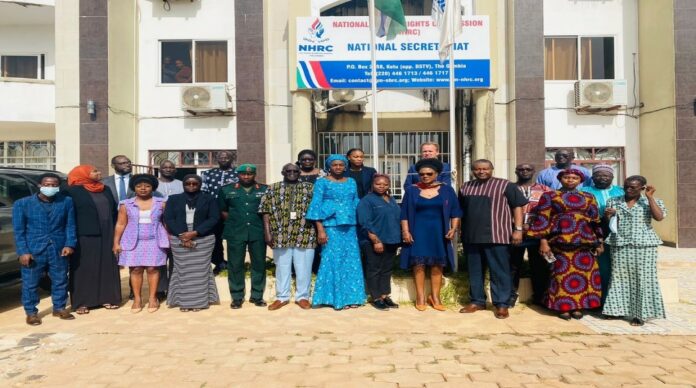By: Ousman Saidykhan
The inaugural meeting of Stakeholder-Monitoring Committee (SMC) on the implementation of the Truth, Reconciliation and Reparations Commission (TRRC) was convened at the National Human Rights Commission (NHRC) to discuss the rationale for the establishment of the Committee, strategies for the effective implementation of the Committee’s mandate, amongst others.
“Monitoring the implementation of the recommendations is key. The TRRC was not an event, it is a process; and this process will go on for a long time. We have been mandated to do this [monitoring] and we want to do it very well with your support,” said the NHRC Chair, Mr Emmanuel D Joof said at the opening on Thursday, 1st December 2022.
The TRRC recommended for the NHRC to be given the responsibility of monitoring the implementation of its recommendations and give annual report to the National Assembly on the status of implementation.
The government, in its white paper that accepted almost all the TRRC recommendations, approved that the NHRC is “well placed” not only to monitor the implementation process, but to also make recommendations to the government on better implementation.
“It is important to ensure that the monitoring process is as inclusive as possible and involves a wide range of stakeholders including the victims and their families. We must not underestimate the monitoring phase,” said Ms Seraphine Wakana, the UN Resident Coordinator in the Gambia.
The representative from the Justice Ministry, Mr Kimbeng Tah said: “This Committee will be a very key tool, a resource and a reservoir for obtaining information. But I also urge NHRC to go beyond the committee and go out into the field design innovative framework to obtaining information because the monitoring has to meet three key criteria; it has to be credible; it has to be actionable; and it has to have quality indicators.”
The NHRC is an independent body with the statutory mandate to promote and protect human rights in the Gambia.
The NHRC boss said they have conducted some study tour to South Africa, together with some CSOs to learn what worked for the African country during the implementation of their truth commissions for them to guide themselves.
“In the South African system, there was no one body that was given the mandate to monitor. So, what you have were different stakeholders monitoring different parts,” the Mr Joof said.




